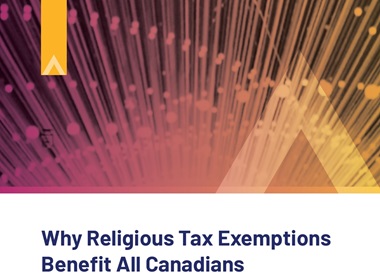 Cardus released a report November 12 which all pastors and church leaders should keep tucked away somewhere.
Cardus released a report November 12 which all pastors and church leaders should keep tucked away somewhere.
In the face of increasing demands that churches should be taxed, ‘Why Religious Tax Exemptions Benefit All Canadians’ provides a convincing argument that non-taxed churches offer far more benefit to the broader community than would taxed churches.
The report points out that congregations are helping their communities by running foodbanks or shelters, providing space for community groups, offering addiction or other counselling, etc – and that their work would be harmed if they were forced to pay taxes.
Following are the Introduction and Key Points, which lead off the 23-page report by Mike Wood Daly. Go here for the full report.
Introduction
Religious organizations in Canada, if they are registered charities, are exempt from paying various forms of taxes. Recent media reports from Iqaluit, Montreal and Nova Scotia suggest that some Canadians are questioning whether these organizations should be allowed to maintain some or all of these exemptions.1
In 2019, the Centre for Inquiry Canada suggested that religion “costs” Canadians up to $3 billion each year in tax exemptions.2 One commonly heard argument for removing tax-exempt status is that religious congregations are essentially clubs, primarily benefiting their own members.
The American comedian and political commentator Bill Maher has expressed this view:
The atheists, agnostics, and anti-religionists are 22.8 percent [of the American population]. That means that almost a quarter of us in America are being forced to subsidize a myth that we’re not buying into. Why am I subsidizing their Sunday morning hobby?3
Is it accurate to say that the wider society is ‘subsidizing’ religious congregations? This paper seeks to answer this question by comparing the dollar value of congregations’ socio-economic contribution with the dollar value of the tax exemptions they receive and the tax credits that their donors receive. It finds that the socio-economic contribution is an estimated 10 times greater than the tax exemptions and credits.
Key Points
- A religious congregation’s ‘Halo Effect’ is the dollar value of its socio-economic contribution to society.
- As registered charities, religious congregations are usually exempt from paying property tax, income tax and GST/HST. They are also able to issue charitable tax receipts for donations received, which donors can use to reduce their own taxes owing.
- The Halo Effect, and the value of tax exemptions and credits, were calculated for 64 Christian congregations in Canada.
- The congregations’ Halo Effect is 10.47 times the value of the tax exemptions and credits, on average. Put differently, the value of the tax exemptions and credits is less than one-tenth the value of what these congregations contribute socio-economically.
- The net-positive socio-economic contribution (Halo Effect, minus the value of tax exemptions and credits) of all religious congregations in Canada is an estimated $16.5 billion.
- If religious congregations ceased being tax-exempt, their Halo Effect would likely decline. Since they would no longer be able to issue charitable tax receipts, their revenue would likely decline, and since they would need to start paying taxes, their funds available for other spending would likely decline also.
- If the congregations’ Halo Effect declined by more than 10 percent, society would be worse off, socio-economically speaking, by removing the tax exemptions and credits.
Go here for the full report.
Cardus is a non-partisan think tank dedicated to clarifying and strengthening, through research and dialogue, the ways in which society’s institutions can work together for the common good.
Mike Wood Daly, BSc, MDiv, DMin, has been active in community economic development as the executive director of a community-based nonprofit.
Daly will offer a half-hour webinar presentation, November 29 at noon: ‘Congregations that Make a Difference in Their Community: The Halo Effect.’
